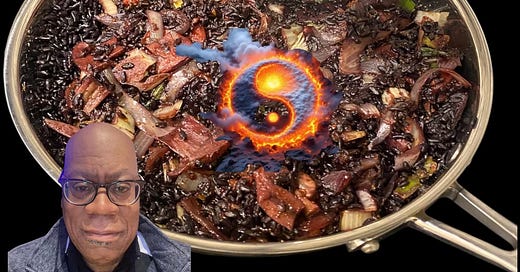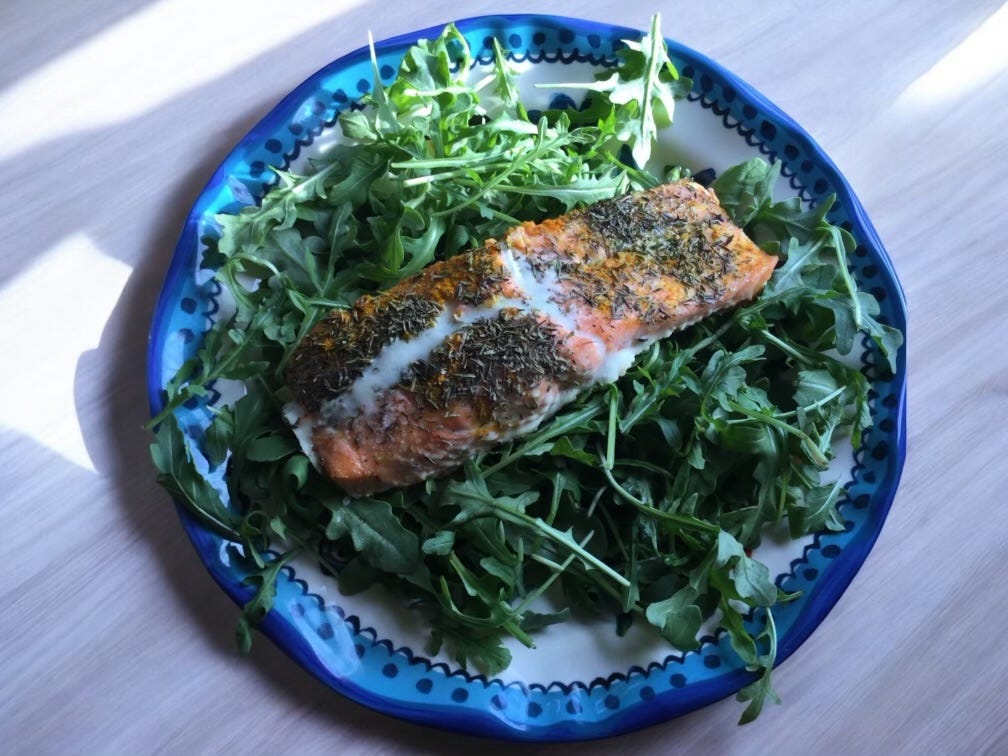I Typically Eat Only One Meal a Day
Here’s the Scoop On Why
Taoism has taught me that the best way to approach life—and food—is through simplicity.
In a world obsessed with overconsumption, fad diets, and overpriced “superfoods,” I’ve chosen a radically different path: eating less, eating smarter, and spending little. My food philosophy is a reflection of the Tao itself—flowing effortlessly, without resistance, and maximizing energy while minimizing waste.
I eat one major meal a day, and it’s almost always clean, nutrient-dense, and cost-efficient.
My grocery budget is $50 per week. Sounds impossible? It’s not. By prioritizing greens, soups, and home-cooked meals, I’m proving that vibrant health doesn’t require excess—it requires wisdom.
The Problem: The Modern Food Trap
Look around, and you’ll see how disconnected people are from food. Supermarket aisles are lined with heavily processed, overpriced pseudo-foods. Restaurants serve meals bloated with unnecessary calories, additives, and hidden costs.
The average person spends a small fortune on groceries and takeout, yet still struggles with health issues. The irony? Eating well doesn’t have to be complicated or expensive.
Taoism teaches that excess leads to imbalance. When we overeat, overconsume, and overindulge, we create disharmony in the body and mind. The key is to strip away the unnecessary and return to what is essential.
For me, this means eating one thoughtfully prepared meal a day, supplemented with world-class vitamins, and cooking at home to stay in control of my nutrition.
Why One Meal a Day?
Intermittent fasting has deep roots in ancient wisdom, including Taoism. When we eat less frequently, our digestion improves, our body has time to repair itself, and our energy levels become more stable. Instead of being enslaved to constant snacking and insulin spikes, I allow my body to work efficiently.
My one meal a day is nutrient-dense and packed with clean proteins, greens, and healthy fats. I prioritize whole foods and avoid empty-calorie fillers.
The result? I generally feel sharp, energized, and free from the sluggishness that comes with mindless eating.
Eating Well on $50 a Week
Most people assume that healthy eating is expensive. But that’s a myth—if you know how to be smart about it. I keep my grocery list simple:
• Leafy greens (kale, spinach, chard)
• Legumes and lentils (cheap, protein-rich, and versatile)
• Soups and broths (nutrient-packed and cost-effective)
• Healthy fats (olive oil, avocados, nuts in moderation)
By avoiding expensive, unnecessary packaged foods and focusing on whole ingredients, I’m able to nourish my body without draining my wallet.
And for those days when I want to eat out? My go-to is Chipotle—a rare fast-food chain where I can get a relatively clean, protein-packed meal without the usual garbage found in processed foods. It’s a calculated indulgence, not a random act of convenience.
The Tao of Indulgence: Drinking & Eating Out with Intention
Life is about balance, not rigidity. That’s why I allow myself one junk-food happy hour night when I feel like it. Whether it’s a grass fed burger, fries, or a cocktail, I indulge mindfully—not habitually. I keep alcohol to a minimum, knowing that excessive drinking drains energy, disrupts digestion, and derails focus.
This is the essence of Taoist wisdom: indulge consciously, not recklessly. Taoism doesn’t preach asceticism—it teaches flow. The key is to align indulgence with intention rather than impulse.
Preparing for the Future: Growing My Own Food
With food prices soaring and the quality of mass-produced food declining, self-sufficiency is becoming a necessity. That’s why I’m planning to start my own garden this spring—another way of harmonizing with nature and taking control of my food supply.
Taoism teaches us to work with nature, not against it. Growing my own greens, herbs, and vegetables is not only cost-effective but also a deeply grounding practice.
Gardening is an act of sovereignty. In a world where corporate food chains dictate what we consume, growing our own food is an act of reclaiming autonomy.
Food as a Spiritual Practice
Taoism sees eating as an energetic exchange. Food isn’t just fuel—it’s qi, life force. Mindful eating isn’t about counting calories or obsessing over macros; it’s about honoring the nourishment that food provides.
I eat with awareness—chewing slowly, tasting every bite, and avoiding distractions. I avoid eating out of boredom or stress, understanding that emotional eating is a symptom of imbalance. Instead, I let my body guide me.
This approach has transformed not just my health, but my relationship with food itself. Eating is no longer a mindless act—it’s an intentional ritual, a practice of presence.
The Takeaway: Simplicity is Power
Most people overcomplicate food. They chase the latest diet trends, waste money on overpriced health products, and stress about what to eat. But the truth is simple: eat clean, eat less, eat smart.
Taoism teaches that power lies in simplicity. By cutting away the excess, I’ve found a food lifestyle that is affordable, sustainable, and profoundly nourishing.
You don’t need a six-figure salary to eat well. You don’t need fancy superfoods or diet plans. You just need wisdom, discipline, and a willingness to break free from modern food traps.
The Tao of eating is about flow, balance, and intention. And once you embrace it, you’ll realize that less truly is more.
If the daily Chocolate Taoist nomadic wisdom lights up your day, fuels your mind, or gives you a fresh perspective, I’d love your support as a paid member!
Or, if you’re feeling generous, drop a little (or a lot) of dirty chai latte love my way—every bit helps keep this Taoist journey flowing.
I’m committed to delivering high-quality, thought-provoking features straight to your inbox—no paywalls, no fluff, just raw, unfiltered wisdom on what it means to be human in today’s paradoxical, mysterious, and uncertain world.
Your support fuels my full-time mission, and I appreciate every single contribution. Let’s keep this energy going!






I so very much love this! Of course, listening to your body is always a skill to be honest and nurtured...every body is different and has different needs, different cravings to battle, etc. I, personally have been eating one meal a day for the majority of my life. My body feels more energetic and my mind is definitely sharper. I used to get in trouble at work because I'd never take a lunch break. Trying to rationalize to some people why I get tired after eating lunch was very difficult and rarely productive, so is topped trying to explain and took advantage of taking my breaks in quiet solitude outside writing or watching whatever was going on around me. Dinner is the ideal meal for me and allows me to put more thoughtfulness into what I'm creating because I only get one a day! I go to bed happy and fulfilled knowing that I have a clean meal in my belly. Thanks for sharing. I deeply enjoy your writings.
What an inspiring article, Diamond-Michael!
I also have a wonderful -- and very affordable -- diet.
Do you buy food in bulk? I do, and it's all organically grown and at wholesale prices. It costs less to buy oatmeal, for example, this way than it is to buy it from Walmart. I actually did a price comparison.
Eating less often is something I'll think about. Being a morning person, I wake up really hungry. So I have two courses from breakfast, and then a hardy lunch. Dinner is usually really simple. And I take cues from my body, although I sometimes eat for the wrong reasons -- something I'll pay more attention to.
Recently I quipped on a comment that I probably eat better than most billionaires, and I think that's true. I absolutely love my diet, have been vegan for over forty years, and know how to make that work beautifully.